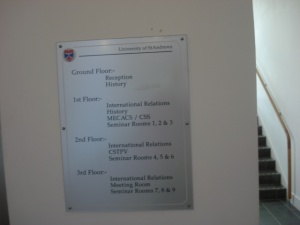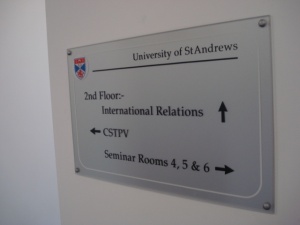Centre for the Study of Terrorism and Political Violence
Centre for the Study of Terrorism and Political Violence is one of the key terrorology research centres with close links to government, intelligence agencies and other terrorology centres such as the RAND Corporation.
The CSTPV is based on the second floor of the New Arts Building at St Andrews University. It is not prominently advertised and does not even have a plaque on the (security controlled) door to announce its presence. There is no indication outside that the Centre is there, only a sign beside the ground floor lift and a smaller sign on the second floor.
Contents
Excerpt from CAMPACC article
In 1993 Bruce Hoffman temporarily left RAND to found the Centre for Studies in Terrorism and Political Violence (CSTPV) at the University of St Andrews. Hoffman is currently an Honorary Senior Research Associate at the CSTPV. Brian Jenkins, a Senior Analyst at RAND who founded the corporation's terrorism research programme in 1972, is currently a member of the CSTPV Advisory Council. The relationship is further strengthened through the collaborative establishment of the RAND-St Andrews database of 'international terrorism incidents'.
The RAND-St Andrews nexus skews understandings of 'terrorism', especially through its pivotal role in the peer review and publishing of research. Members of the Centre and of RAND hold key editorial positions on the two foremost academic journals in the field: Studies in Conflict and Terrorism, and Terrorism and Political Violence. Those journals emphasise political violence directed against states, while largely ignoring violence by states, except those not allied to US or Western European countries - i.e., those described as 'rogue states' by the US government.[1]
Embedded experts define 'terrorism' selectively, with a bias towards US-led alliances and against any resistance. According to Prof. Paul Wilkinson, Director of the CSTPV, extra-judicial assassinations by Israel are 'ruthless acts of counter-terror', i.e. self defence [2]. Within this perspective the USA, the UK and their client states never carry out 'terrorism'.
In a mid-1990s government inquiry on terrorism, Wilkinson emphasised violence by oppressed groups, while ignoring state violence against them. In particular he problematised trans-national support for 'the weak':
- almost any prolonged and significant terrorist campaign is likely to have an international dimension: almost every terrorist group tends to look across the borders of the state where it is based, and further afield, not only for weapons, funds, training and safe-haven, but for any ideological, political or diplomatic support it can manage to obtain; sub-state terrorism is typically the weapon of the weak [3].
Such diagnoses justified permanent anti-terrorist legislation to target the weak.
That report led to the Terrorism Act 2000, which broadened the definition of terrorism. It blurred any distinction between political protest and organised violence, as well as any distinction between ideological and material support. This law redefined terrorism to include simply 'the threat' of 'serious damage to property', in ways 'designed to influence the government' for a 'political cause'. Moreover, it banned organisations on the basis that their activities abroad fit that broad definition, and criminalised any 'association' with such organisations in Britain. After the September 11 attacks, the EU Council redefined terrorism in even broader ways. Predictably, such powers have been used to intimidate (and sometimes prosecute) political opponents of oppressive regimes allied to the UK. These developments ominously bring home to Britain the counter-insurgency theory that was deployed in its colonies, and in Northern Ireland during the 1970s, to counter political revolt.
An associate of the CSTPV, Rohan Gunaratna (2003), has offered expert testimony in UK prosecutions for supposed membership in 'terrorist' groups. In the court case of Meziane, several refugees in Leicester were accused of fund-raising for terrorist activities abroad. After Gunaratna claimed that they were Al Qaeda members, he was challenged by the defence to provide documentation, but he did not. Consequently, the allegations were dropped and he was not recalled as a witness. Neither did the prosecution take up his similar offer in another case against refugees for alleged membership of the Kurdistan Workers Party (PKK). Nevertheless Gunaratna is still quoted as an expert by journalists.
Embedded in the Iraq occupation
Beyond its academic roles, the RAND-St Andrews nexus has close professional links with key political and corporate players in the 'war against terror'. An important example is Bruce Hoffman, founder member of the CSTPV and currently RAND Corporation's key expert on terrorism. In 2004 he was appointed as senior advisor on counter-terrorism and counter-insurgency to the Constitutional Provisional Authority in Iraq. Hoffman argued that the occupation strategy can be successful only if it adopts a British colonial model of counter-insurgency, comparable to perspectives in Frank Kitson's Low Intensity Operations.
The CSTPV also has institutional ties to the private military industry. One example involves founder member of the CSTPV and current Honorary Senior Research Fellow, David Claridge. In 2001 Claridge established Janusian Security Risk Management Limited, a private military intelligence and security company, as a subsidiary of the political risk firm The Risk Advisory Group. The company claimed to be the first Western security firm with an independent operational office and a country manager permanently based in Iraq. In the press statement accompanying its launch, Janusian acknowledges their link with the CSTPV in this collaboration, which 'includes shared access to research, intelligence sources and databases, and the expertise of the Centre's staff, as well as the development of sector-specific studies into areas of political risk'.
Like their antecedents in counter-insurgency theory, present-day embedded experts emphasise techniques for total war against both political and military resistance. Hoffman blames the USA's inadequate planning for the 'insurgency' problem in Iraq. According to him, 'a critical window of opportunity was lost because we failed to anticipate the widespread civil disorder and looting that followed the capture of Baghdad'; this key mistake 'breathed life into the insurgency.' In his analysis, the insurgency originated independently of the invasion; it has no link with the occupiers' activities there.
Staff
- Paul Wilkinson, Chairman
- Magnus Ranstorp
- John Horgan
- Anthony Richards
- Peter Lehr
- Gillian Mcllwaine, Centre Secretary
Advisory Council
- Carl Bildt - former Swedish Prime Minister and UN Envoy for the Balkans
- Scott Campbell - CEO, Informa Group, Washington at its subsidiary Washington Policy and Analysis, Inc.
- Jayantha Dhanapala - Former UN Under Secretary General for Disarmament now Head of Peace Commission, Sri Lanka
- Giandomenico Picco - UN Under Secretary General, Geneva
- William Walker - Head of School of International Relations
- Alex P. Schmid - Erasmus University & UN Terrorism Prevention Branch
- Martha Crenshaw - Professor of Government, Wesleyan University
- Paul Wilkinson - Chairman of CSTPV Advsory Board
- Brian Jenkins - Senior Consultant to President of RAND Corporation, Santa Monica
- Guy Sanan - General Manager, Laureus World Sports Awards
- Magnus Ranstorp - Director of CSTPV, University of St Andrews
2008
- Professor Paul Wilkinson - Chairman of CSTPV Advsory Board
- Mr Carl Bildt - former Swedish Prime Minister and UN Envoy for the Balkans
- Mr Scott L.Campbell - CEO, Washington Policy and Analysis
- Amb. Jayantha Dhanapala - Former UN Under Secretary General for Disarmament, now Senior Advisor to the President of Sri Lanka
- Mr Giandomenico Picco - former UN Assistant to Secretary General, now CEO of GDP Associates
- Dr. Ali Watson, Head of School of International Relations
- Professor Martha Crenshaw - Professor of Government, Wesleyan University
- Mr Brian Jenkins - Senior Consultant to President of Rand Corporation, Santa Monica
- Dr Magnus Ranstorp - Research Director of the Centre for Asymmetric Threat Studies at the Swedish National Defence College
- Dr Guy Sanan - General Manager, Laureus World Sports Awards
- M.J. Gohel - CEO of the Asia Pacific Foundation, London[4]
Other Associates
- Rohan Gunaratna, former member
- Andrew Silke Honorary Senior Research Associate
Funding
- £250,000 from the Economic and Social Research Council to research the Domestic Management of Terrorist Attacks, 2002
- $300,000 from Washington Policy and Analysis, Inc., 2002
Contact, References and Resources
Contact
School of International Relations, University of St. Andrews New Arts Building, Library Park, The Scores St Andrews, Fife, KY16 9AX Scotland, UK
Resources
- Source:Campaign Against Criminalising Communities (CAMPACC), Embedded Experts in the 'War on Terror'
References
- ↑ Burnett, J. and Whyte, D., Embedded expertise and the "War on Terror", Journal for Crime, Conflict and the Media, 2005, 1(4): 1-18.
- ↑ Wilkinson, P., Terrorism Versus Democracy: the Liberal State Response. London: Frank Cass, 2002, p. 68.
- ↑ Wilkinson, P., Inquiry into Legislation against Terrorism, Vol. 2, 1996, Lord Lloyd of Berwick, Cm 3420, p. 4.
- ↑ Advisory council, accessed 8 May 2008.


